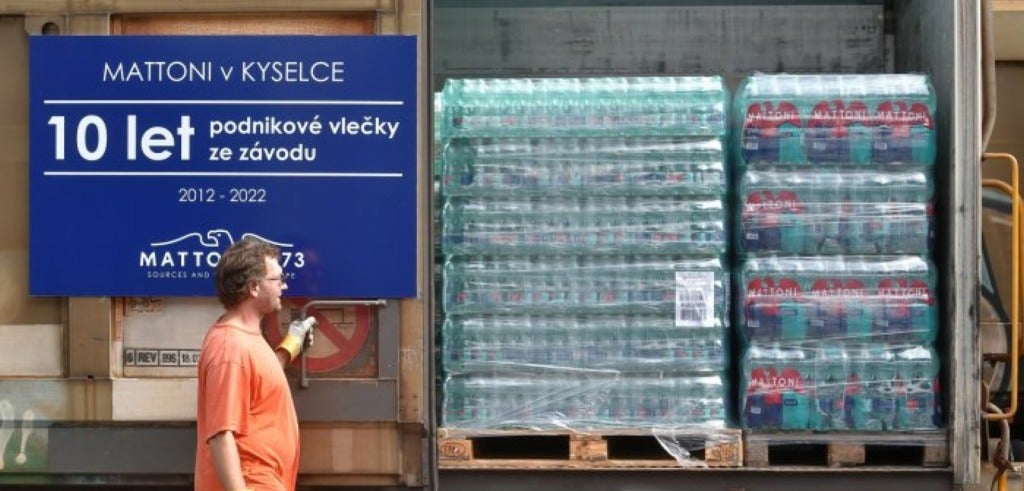When your business spans 8+ countries and serves millions of customers, every process needs to run like clockwork. That was the challenge faced by Mattoni 1873 — a leading Central European beverage producer — as they managed an increasingly complex operation with more than 3,500 employees.
As the company grew from their historic Czech roots into an international enterprise, they navigated roadblocks like ERP implementation issues, regional system preferences, and evolving user requirements. They needed a solution that could bridge these gaps while extending the capabilities of their Microsoft SharePoint and supporting their ambitious expansion goals.
The company opted to lean into a product they’d had for years but hadn’t fully utilized: Nintex Automation K2.
While K2’s workflow automation capabilities provided a strong foundation, Mattoni 1873 decided that specialized expertise could help them harness its potential. Their search for such a solution led them to forge a crucial partnership with Process Point, a Czech process automation specialist, for customized implementation expertise.
The need for an agile, reliable workflow automation tool
Growing a family business into a multi-national beverage powerhouse comes with unique hurdles. For Mattoni 1873, three distinct challenges emerged in their quest for efficient workflow automation:
1. Global adoption of Mattoni’s enterprise resource planning (ERP)
The first major obstacle was standardizing their ERP system across different countries — a critical foundation for sustainable international growth. Rather than simply deploying their existing system in new markets, each implementation required extensive customization. Without a unified ERP system, Mattoni 1873 would face increasing inefficiencies as they expanded, threatening their growth trajectory.
“What works in one country needs to be heavily modified for another,” says Tomas Koubek, Group Business Solutions Director at Mattoni 1873. “This will improve once we unify our ERP system, which is already on the roadmap. But for now, deployment is slow due to the extensive integrations required. Instead of ‘lift and shift,’ we have to ‘lift and modify,’ which takes significant time and effort.”
2. Internal buy-in
As Mattoni 1873 expanded across Europe, they recognized shadow IT taking place — or when employees use tech or tools without the knowledge or agreement of IT — across country teams. The company needed a solution flexible enough to accommodate these regional differences while still maintaining operational efficiency — a delicate balance between standardization and local autonomy.
“The operations in these countries have a level of independence, so they are strong enough to say, ‘No, thank you. We will do this a different way or use a different tool,’” explains Koubek. “So we’re working on some strategy and group leadership to make sure that platforms we build will eventually become corporate platforms.”
3. Changes in user requirements
As teams began testing new workflows, they often uncovered additional needs or process improvements. These discoveries, while valuable for long-term success, led to frequent revisions and slower implementation timelines.
“It’s not an issue with the tool itself but rather a need for better methodology and clearer requirements upfront,” Koubek says.
Powering growth with the right tool and partner
Before partnering with Process Point and fully leveraging K2’s capabilities, Mattoni 1873 faced increasing growing pains across the organization. The company needed a flexible, user-friendly automation solution that could handle their complex processes and expand the capabilities of their Microsoft environment.
A platform that goes beyond basic automation
From the beginning, Mattoni 1873 wanted a platform that could create and execute sophisticated custom applications while remaining accessible to users.
The software needed to:
- Identify and automate time-consuming manual tasks
- Perform tasks faster, more accurately, and without human error
- Limit inefficient processes that lead to lost time, costs, and productivity
“We needed more than just forms or basic workflow automation; we were looking for a platform to build robust applications,” explains Koubek. “K2 quickly became our go-to solution. Whenever we need to develop a custom application not available off the shelf, K2 is one of the first options we evaluate.”
The decision to embrace K2 came down to its versatility. The platform offered functionality that previously required multiple external applications — from integrating with company registers for customer information validation to managing the entire contract lifecycle, including Microsoft SharePoint integration, template-based generation, approval processes, and electronic signatures.
A partnership for success
Implementing the automation software required close collaboration between Mattoni 1873’s internal teams and Process Point’s automation and K2 platform experts. By combining K2’s powerful platform with K2 Connect for SAP integration, Mattoni 1873 unlocked new possibilities for process automation that were previously out of reach.
One K2 application, HORECA E2E (Hotel, Restaurant, and Café/Catering end-to-end), lets Mattoni 1873 simplify customer lifecycle management, contract handling, and business condition monitoring, making it possible to automatically keep tabs on systems and profitability.
At the same time, thanks to the online integration with ERP SAP, the sales team can now work more simply and efficiently with just one application to end a contract and negotiate new terms with customers.
Empowering business users
Mattoni 1873’s business solutions team leverages K2 for everything — from seamless integration with SAP data to managing complex internal processes. The platform has proven particularly valuable in areas where the company can’t justify more expensive enterprise solutions.
The partnership with Process Point has been transformative, providing Mattoni 1873 with reliable expertise and patient guidance through their digital evolution.
“We can fully rely on Process Point. Whenever they own something, I know I can sleep well and focus on our other agendas,” says Koubek.
The company now has a solid foundation to automate and optimize processes across their growing business. Most importantly, users have embraced the platform enthusiastically, appreciating its intuitive interface and powerful capabilities.
Driving measurable results with K2
Since implementing K2 with the support of Nintex and Process Point, Mattoni 1873 has seen a range of impressive results that highlight the power of automation and streamlined processes:
- Increased financial savings and gains: “Using K2 is saving us a significant amount per year,” says Koubek. And with the HORECA E2E application, the company’s turnover and profit have also increased. By responding faster to competitive customer offers, Mattoni can now deliver better solutions than their competitors.
- Improved efficiency: The shift from paper-based processes to digital workflows has dramatically improved workforce efficiency. With K2, Mattoni 1873 has streamlined key operations, including customer creation in SAP, automatic contract generation, contract evaluation, accruals automation, and reporting automation through Power BI.
- Better competitive analysis: K2 has helped Mattoni keep a competitive edge as they expand. “K2 has also allowed us to monitor the competitive landscape more effectively,” notes Koubek. “With better reporting, we have more data to help us adapt and stay ahead of the competition.”
- More effective lead acquisition: One of the key improvements has been in how Mattoni tracks and manages leads in their HORECA E2E app. This helps them create recurring incentives and improve the acquisition process.
Looking to the future
Mattoni 1873’s digital journey is far from over. The company has plans to expand K2’s implementation into the Balkans region, including Bulgaria, Serbia, Montenegro, and Bosnia. While this presents unique challenges due to isolated system portfolios, it’s a crucial step in their expansion strategy.
“In 2025, we start a project of ERP replacement,” Koubek shares. “We’ll work with Process Point on redesigning all our applications to ensure compatibility with the new version. Once we’re there, whatever we develop for any country can be almost immediately available for all others.”
While the company maintains a growing backlog of digitalization opportunities, their partnership with K2 and Process Point has established a solid foundation for continued growth and innovation.
As the company expands across Europe and modernizes its infrastructure, the foundation built with K2 positions Mattoni 1873 for continued growth and success, supporting their vision of becoming an increasingly digital beverage leader.













